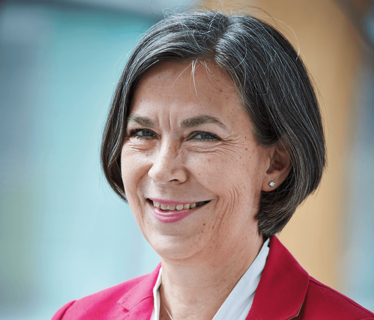Raising Standards
Sitting Down With… Susanne Keitel, Director of the European Directorate for the Quality of Medicines & HealthCare (EDQM) of the Council of Europe in Strasbourg, France.

Did you ever expect to have such a prominent position in pharmaceutical standards?
No, it never crossed my mind. Thinking about it, I really don’t know what I wanted to be as a child. I was very interested in science from a young age, so I think it was clear early on that I would do something related to natural sciences. I decided to study pharmacy as it allowed me to cover a broad combination of topics from chemistry to biology to physics, as well as the more “medical” disciplines, such as pharmacology and toxicology. After school, I worked in a community pharmacy. This gave me insights into the man-on-the-street’s perspectives and concerns.
What happened after you graduated?
After graduating, I decided to pursue a PhD in pharmaceutics. My focus then was on research. It was only later that the important place regulation has in the development and quality assurance of medicines became clear. At that time, I was working in pharmaceutical development at a research-based, globally active pharmaceutical company in Berlin. I worked there for 10 years. During this period, I was involved in a lot of international projects and developed a significant insight into regulations and standards in Europe, Japan and the United States, as well as issues related to their harmonization.
How did you make the switch to the other side?
I saw a vacancy notice for a senior position at BfArM, the German licensing authority (the Federal Institute for Drugs and Medical Devices) and I decided that it would be very interesting to put the experience I had gained in the pharma industry to new use. In the US, regulators and people in industry frequently swap sides, but this is less common in Europe – people tend to pick a side and stick with it. Personally, I think it’s very important for a regulator to understand how decisions impact the industry they regulate – and direct experience is hard to beat in that regard.
At BfArM, I was first responsible for the assessment of the quality part of applications. In addition, I was chair of the German Pharmacopoeia Commission. Later on, I took on additional assignments such as managing European licensing procedures with BfArM involvement. Finally, I was responsible for the executive department of European and International Affairs. Throughout my 10 years at BfArM, I represented Germany in different working groups and committees of the European Medicines Agency and the European Commission. Until moving to the Council of Europe in 2007, I also represented the EU in quality related expert working groups at the International Conference on Harmonization. I have always considered participation in inter-disciplinary and international expert groups as one of the highlights of my work, and for me it was a natural continuation to take up my position as director of the EDQM in 2007.
You’ve recently been busy launching the latest edition of the European Pharmacopoeia...
The 9th edition of the European Pharmacopoeia was released recently and the standards will come into effect on January 1, 2017. More than 50 percent of the 9th edition contains new and revised text compared to the previous edition. This new edition is also much larger than its predecessor and now has three volumes as opposed to the previous two. It also covers new emerging fields, such as aspects related to cell and gene therapy products. Our aim is to provide manufacturers not only with legal standards, but also with information and support. It is very satisfying to see how the European Pharmacopoeia has developed and expanded to continue meeting the needs of its stakeholders.
What do you consider to be today’s biggest industry challenges?
Right now, I think the most important challenges facing the industry are the cost pressures in the public healthcare systems. Companies are under enormous pressure to lower prices, whilst also having to deal with increasing competition from China and India. Of course, we as regulators are also under economic pressure – the EDQM is part of the Council of Europe and our member states have been economically stronger in the past. The European Pharmacopoeia also relies on the support of more than 700 experts nominated by the 37 member states and, for example, frequent mergers in the pharma industry impact our pool of experts because they tend to lead to R&D site closures – reducing the number of scientists in R&D and therefore the availability of industry experts.
What do you enjoy most about your role?
Working for the EDQM is tremendously rewarding because our efforts clearly make a difference. The EDQM demonstrates the benefits of collaboration and work-sharing. Member states working with us can achieve much more together than working in isolation – something that is really satisfying, and yes, includes an element of pride for what we do. Our work at EDQM facilitates access to quality medicines. We are also involved in other areas, such as fighting falsification of medical products, developing guidance for organ, tissue and cell transplantations as well as blood transfusions, just to mention a few.
The role as head of EDQM has many challenges, all working toward providing the best support for protecting public health – of course for member states, but also beyond. In this context, it is very rewarding for me to be able to rely on a very competent and committed team at the EDQM and an excellent network of international experts.
Susanne Keitel is Director of the European Directorate for the Quality of Medicines & HealthCare (EDQM) of the Council of Europe in Strasbourg, France.



















